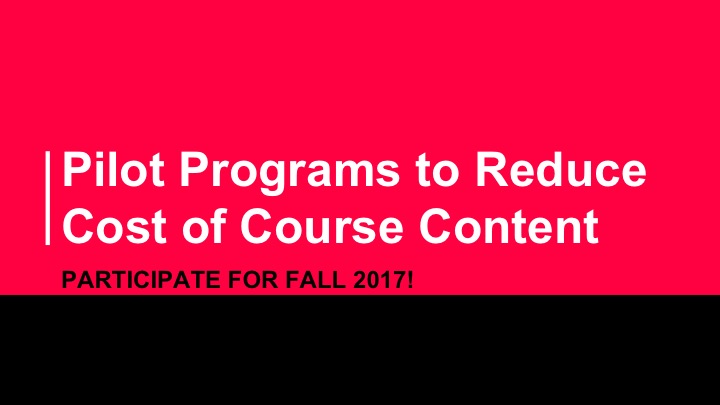Tag: affordable course content
What a semester! What’s up next?

Is it just us, or was fall semester a whirlwind? The Office of Scholarly Communication Services was steeped in a steady flurry of activity, and suddenly it’s December! We wanted to take a moment to highlight what we’ve been up to since August, and give you a preview of what’s ahead for spring.
We did the math on our affordable course content pilot program, which ran for academic year 2017-2018 and Fall 2018. This pilot supported just over 40 courses and 2400 students, and is estimated to have yielded approximately $200,000 in student savings. We’ll be working with campus on next steps for helping students save money. If you have questions about how to make your class more affordable, you can check out our site or e-mail us.
We dug deep into scholarly publishing skills with graduate students and early career researchers during our professional development workshop series. We engaged learners in issues like copyright and their dissertations, moving from dissertation to first book, and managing and maximizing scholarly impact. Publishing often isn’t complete without sharing one’s data, so we helped researchers understand how to navigate research data copyright and licensing issues at #FSCI2018.
We helped instructors and scholars publish open educational resources and digital books with PressbooksEDU on our new open books hub.
On behalf of the UC’s Council of University Librarians, we chaired and hosted the Choosing Pathways to OA working forum. The forum brought together approximately 125 representatives of libraries, consortia, and author communities throughout North America to develop personalized action plans for how we can all transition funds away from subscriptions and toward sustainable open access publishing. We will be reporting on forum outcomes in 2019. In the meantime, one immediate result was the formation of a working group to support scholarly society journal publishers in flipping their journals from closed access to open access. Stay tuned for an announcement in January.
We funded dozens of Open Access publications by UC Berkeley authors through our BRII program.
We developed a novel literacies workflow for text data mining researchers. Text mining allows researchers to use automated techniques to glean trends and information from large volumes of unstructured textual sources. Researchers often perceive legal stumbling blocks to conducting this type of research, since some of the content is protected by copyright or other use restrictions. In Fall 2018, we began training the UC Berkeley community on how to navigate these challenges so that they can confidently undertake this important research. We’ll have a lot more to say about our work on this soon!
Next semester, we’re continuing all of these efforts with a variety of scholarly publishing workshops. We invite you to check out: Copyright & Fair Use for Digital Projects, Text Data Mining & Publishing: Legal Literacies, Copyright for Wikipedia Editing, and more.
We would like to thank Arcadia, a charitable fund of Lisbet Rausing and Peter Baldwin, for their generous support in helping to make the work of the Office of Scholarly Communication Services possible.
Lastly, we’d like to thank all of you for your engagement and support this semester! Please let us know how else we can serve you. In the meantime, we wish you a Happy New Year!
E-mail: schol-comm@berkeley.edu
Twitter: @UCB_scholcomm
Website: lib.berkeley.edu/scholcomm
Event: Affordable Course Content Workshops
Friday, Dec. 8
Open Textbook Workshop – Faculty & Lecturers
9:30-11:30 a.m. | Academic Innovation Studio, 117 Dwinelle Hall
Are you an instructor who is concerned about the impact of high textbook costs on your students? Are you considering adopting or creating innovative pedagogical materials? Explore possible open textbook solutions by attending a two hour workshop and writing a short textbook review. The Library will provide you with a $200 stipend for your efforts! Space is limited, so please submit a very brief application form:
http://bit.ly/facultyOpenTextwkshp
Friday, Dec. 8
Open Textbook Workshop – Staff & Campus Partners
12:45 p.m. – 2:45 p.m. | Academic Innovation Studio, 117 Dwinelle Hall
Register http://bit.ly/openwkshpcampuspartners
Are you a UC Berkeley staff or affiliate who is concerned about the impact of high textbook costs on students, or you are working with a faculty member who is? Do you want to support the adoption or creation of innovative pedagogical materials? Learn the landscape, opportunities, and challenges for open textbooks, and how to discuss whether open textbooks are a good fit.
Tuesday, Feb. 20
Publish Digital Books and Open Textbooks with Pressbooks
1:10-2:30 p.m. | Academic Innovation Studio, Dwinelle Hall 117 (Level D)
Register http://bit.ly/0220pressbooks
If you’re looking to self-publish work of any length and want an easy-to-use tool that offers a high degree of customization, allows flexibility with publishing formats (EPUB, MOBI, PDF), and provides web-hosting options, Pressbooks may be great for you. Pressbooks is often the tool of choice for academics creating digital books, open textbooks, and open educational resources, since you can license your materials for reuse however you desire. Learn why and how to use Pressbooks for publishing your original books or course materials. You’ll leave the workshop with a project already under way!
Participate in an Affordable Course Content Pilot Program!

Dear UC Berkeley faculty and lecturers,
We can help you make your assigned readings and textbooks more affordable to students. The Library and the Center for Teaching & Learning have launched two pilot programs for Fall 2017, for which your participation can save students potentially hundreds of dollars each.
-
The first pilot service aims to reduce the cost of your print course packs through Library-assisted syllabus processing. We will locate copies of open, free, or Library-licensed versions of your assigned readings so the overall price of the print course pack or course reader is reduced.
-
The second service provides you with grants to either use, adapt, or develop open or library-licensed electronic textbooks and course materials. This can help save students the cost of purchasing expensive textbooks.
Please fill out this brief form if you are interested in participating in one or both pilots (described more fully below), and we will contact you soon with details.
______________________________
Pilot 1 (Course Packs): Do you assign your students a print course pack for purchase? We can help reduce the cost of that print course pack.
With the first piloted service, the Library will process your syllabus for you and search for your required readings to locate copies of open, free, or Library-licensed versions of assigned readings.
-
If open, free, or Library-licensed versions are available, we will give you links or PDFs to post to bCourses at no cost to your students, reducing any remaining readings that a student would have purchased as part of a print course pack.
-
We will also provide guidance to you for making fair use decisions–further reducing the cost of course packs, because we can help you limit instances in which a third party copy center would need to secure copyright clearance for assigned readings.
______________________________
Pilot 2 (Grants): If you assign textbooks or other books, will you let us pay you from $500 up to $5,000 to switch to an electronic version of that book or to an equivalent eBook or combination of books? Or will you let us help you in adopting, adapting, or designing your own open and electronic course materials?
The Library and the Center for Teaching and Learning are offering grants and programmatic support to instructors to enable you to link to open or Library-licensed electronic textbooks or other eBooks–or even to design your own.
-
The grants range in value from $500 (e.g. for switching one required print book to a Library-licensed electronic book that can be linked to in bCourses) all the way up to $5,000 to receive programmatic support to design your own open & electronic course materials for students so they don’t have to purchase expensive textbooks.
-
The Center for Teaching & Learning and the Library can also help you find campus support to update any other attendant PowerPoints, assignments, or materials that need alteration following a change in assigned books or textbooks.
If you have any questions, please contact the Library’s Scholarly Communication Officer, Rachael Samberg: rsamberg@berkeley.edu. You can also find out more about affordable course content in our Guide to Open, Free, & Affordable Course Materials.